Kroger Is Building a Grocery Ecosystem for the Future
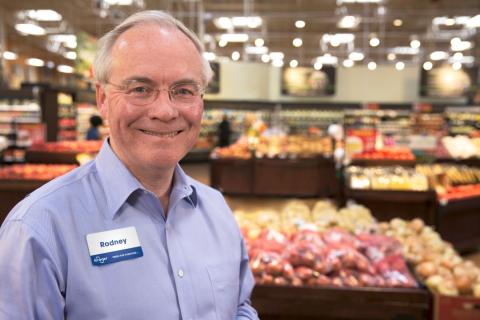
If you ask Kroger CEO Rodney McMullen how inflation is affecting customer traffic at his stores, he just might tell you a story about cheese.
“Our value proposition always starts with our people, whether it’s a smiling face or helping somebody prepare a meal. And with inflation being what it is, we’re trying to help people manage their budget, but at the same time not have to give up anything, including good cheese,” McMullen says in an exclusive interview with Progressive Grocer. “What I thought was cheese, growing up, isn’t what I think is cheese today. I didn’t know the difference until the Murray’s Cheese folks started sharing with me some of the amazing cheeses we have, and those are things you can only get at Kroger. My wife and I, we love mac and cheese. And the cheese that we used to use in our mac and cheese isn’t what we use now, thanks to Murray’s. And once you do that, you don’t go back.”
The grocery giant’s acquisition of the small artisanal cheese brand back in 2017 now seems like another magical moment of Kroger foreshadowing. Today, more consumers than ever before are cooking at home, often using premium products that are frequently store brands. They’re cooking at home partly because they got used to doing it during the pandemic, and partly because they’re looking to cut costs amid food price inflation. Whatever the reason, Kroger has leveraged these trends — plus investments in technology, innovation, fresh, supply chain and alternative business units — into record-setting traffic and growth.
McMullen explains why he’s so excited about the momentum in his business, even amid a rapidly changing operating environment.
“We were on a journey before COVID, trying to make sure that a customer could engage with us seamlessly, whether in-store, with pickup or with delivery,” he notes. “COVID significantly accelerated that by three or four years. And that’s pretty much stayed in place; the people that used to shop online or use pickup, more than 90% of them are now shopping in-store also. So I find it exciting, because what we want to do is to be able to serve a customer however they want to be served, whether that’s delivery, pickup or in-store. And what we find is, customers are bouncing back and forth among the three.”
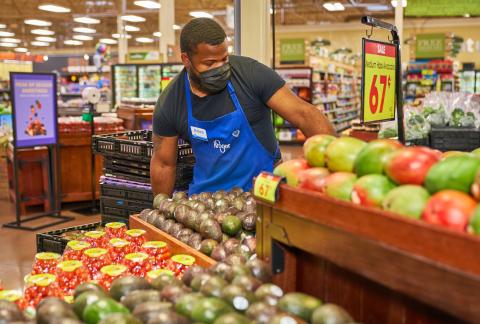
Value Creation Flywheel
The inflationary and supply chain crises currently rocking the country are proving to be no match for Kroger. The grocery chain, which saw an earnings boost during the pandemic, isn’t seeing that much of a slowdown as consumers keep cooking at home and loading their pantries to save money as prices rise.
“Customers have learned how to cook,” McMullen says. “A lot of customers know how to cook today more than they did before, and they love showing those skills off, and they’re finding their food budget stretches a lot further when they cook at home. Those are things that are helping somebody’s budget go further, but also it helps support the company’s growth.”
For the fourth quarter ended Jan. 29, same-store sales increased 4% at The Kroger Co., which today operates more than 2,700 physical grocery stores under various banners. Digital sales grew 105% on a two-year stack. Total company sales were $33 billion for the period, versus $30.7 billion for the same period last year. Total company sales, excluding fuel, increased 3.7% compared with the same period last year. Net income at Kroger totaled $566 million, or 75 cents per share, a 1.7% increase from the prior-year period.
For fiscal 2021, revenue at Kroger was $137.9 billion, an increase of 0.2%. Net earnings for fiscal 2021 were $1.6 billion, an increase of 1.2%. Same-store sales excluding fuel increased 14.3% on a two-year stack. Digital sales grew 113% on a two-year stack.
Kroger expects same-store sales growth of 2%-3% without fuel, and adjusted earnings per share of $3.75-$3.85 in fiscal 2022.
“Kroger’s 2021 results demonstrate the strength of our value creation model, and in 2022 we expect to build on this momentum,” Gary Millerchip, Kroger’s CFO, said in March. “We will continue to be disciplined with capital allocation. In 2022, we are increasing capital investments in strategic priorities that will drive sustained future earnings growth. At the same time, we expect to generate strong free cash flow and we will continue to return excess cash to shareholders.”
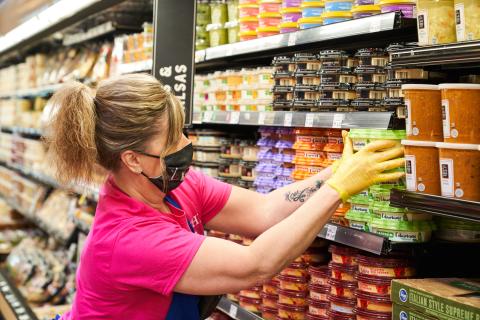
Kroger returned $2.2 billion to shareholders in 2021. The company repurchased $1.6 billion of shares in 2021, under its board authorizations. Kroger also increased the dividend by 17% from 72 cents to 84 cents, marking the 15th consecutive year of dividend increases, which resulted in a payout of $589 million.
In a recent business update, the grocery chain outlined four key themes of the company’s post-pandemic business model:
- Growing the food business through the competitive moats of innovation, technology, partnerships and people.
- Leveraging assets such as data, retail media, retail health, fuel and personal finance, which are margin accretive and have clear paths to additional growth outside of the traditional grocery segment.
- Investing in other assets to drive sales growth, which in turn generates data and traffic that enable fast-growing alternative profit streams.
- Using free cash flow to invest in the business that drives net earnings growth. This flywheel creates value for shareholders, and confidence in growth earnings of 3%-5% per year, which enables funding of capital projects to grow the business, increase dividends and enable shareholder return of 8%-11% over time.
Kroger today serves 60 million households, and 82% of its customers live within 5 miles of a store. McMullen attributes Kroger’s ability to navigate the peaks and valleys of the pandemic to an adherence to the things that really matter.
“Our core values have been incredibly helpful throughout the pandemic,” he asserts. “I always tell people: ‘The company will change, the way we feed people will change over time, but our values will always remain who we are,’ and I don’t see them changing because of COVID.”

Leading With Fresh 2.0
A big part of the Kroger value proposition is Full, Fresh and Friendly: omnichannel stores full of the products that shoppers are looking for, offering fresh food no matter how shoppers shop, and always friendly service.
The “fresh” part of Kroger’s value prop propelled the grocer to record performance in 2021, on top of record results in 2020. Today, more than 70% of grocery shoppers choose a grocer based on its selection of fresh food, and 92% of Kroger customers buy at least one fresh product per trip. The grocer reported a 15.6% increase in fresh sales growth in 2021. In fact, Kroger’s fresh departments grew faster than its center store departments in 2021, so leading with fresh is a core competitive priority for the company.
During the fourth quarter, Kroger successfully completed the initial phase of its in-store End-to-End Fresh Initiative, which is designed to deliver fresher food to shoppers and keep perishables on the shelf longer. The initiative has five key components: suppliers (leveraging data and technology to choose the best suppliers when it comes to supply chain and quality); distribution (decreasing the time product spends in transit); merchandising (optimizing assortment/pricing); refrigeration (more mobile refrigeration ensures that product stays fresher when the customer buys it); and loyalty programs.
According to McMullen, the company is doing everything it can to keep fresh food affordable for customers amid historic inflation.
“We believe all customers deserve to have access to fresh, affordable food, so everything that we do is around helping a customer get affordable, fresh food,” he explains. “So you’re looking at everything you can. In some cases, it might be consolidating from multiple suppliers to one so that they have more efficiencies. In other cases, it’s identifying your total supply chain costs with a CPG partner, and how do you eliminate it? In a lot of places, technology’s an important part of that, and how do you eliminate steps?”
Another important differentiator for Kroger in this environment has been private brands. The company’s $28 billion Our Brands division launched 72 new items during the fourth quarter, many in support of providing easy food-at-home meal solutions, including Simple Truth skillet meals for two and Kroger brand multiserve tray meals.
“One of the changes we made a few years ago, before COVID, was looking at all the different types of food that people eat, as opposed to only traditional grocery store food,” McMullen notes. “And what we want to do is to be able to have a meal that’s already made for you, or really easy to make, or the ingredients. So we’re serving all of those buckets. It’s one of the reasons we merged with [meal kit company] Home Chef. And we’re leveraging Home Chef back into the Kroger stores as well. So their business continues to grow incredibly well on a direct-to-customer basis, but we’re also leveraging their recipes and leveraging their talent back into the Kroger stores.”
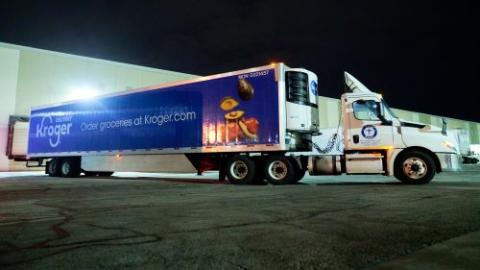
During the March business update, Kroger said that it sees products in the natural/organic, multicultural and health/cleaning areas, and innovative categories such as plant-based foods and functional beverages, as being double-digit growth drivers for the company in the future. Retail foodservice will also remain a focus.
“If you’re eating, we want to serve you when you eat, and we want to serve you if all of a sudden you’ve got three or four people over that you didn’t expect, and you need a delivery or a pickup in a short amount of time,” McMullen says. “If you want amazing cheese or cut fruit or something out of the meat department or deli. We’re really striving for the customer to decide how they want to engage with us, and then use technology to make it really easy for them to engage with us. And [we want to] make sure that we’re personalizing and curating that experience for each person individually.”
Another important differentiator for the company, especially now, is fuel. Kroger seems to be benefiting from the surge in fuel prices as shoppers look for discounts on gas.
“Customers that redeem fuel points spend, on average, four times more at Kroger and visit four times more frequently,” McMullen says. “Our investment in fuel rewards, which is reflected in our supermarket gross margin, also helps customers stretch their dollars further and allowed us to achieve gallon growth of 5% in the fourth quarter, outpacing market growth.”
Other operational initiatives that the company is focused on in 2022 and beyond include a new enhanced inventory management system powered by mobile platforms, which improves in-stocks and replenishment systems; a new artificial-intelligence (AI) forecasting and ordering app for fresh food; a new associate scheduling and training mobile platform; and the expansion of a smart shopping cart system called KroGo.
McMullen admits that although the supply chain has improved, it’s not back to pre-pandemic normal.
“If you look at every week, we’re making progress on improving in-stocks and supply chain,” he says. “It’s an active conversation that we have with every partner, especially the CPG partners. And in some cases, we pick product up to be able to get it faster to the warehouse. But it’s an incredibly open and transparent relationship with suppliers, and every week, we’re getting better. Would I like to say that it was completely back and everything was normal? It’s not. And with every supplier, you have a specific timeline on how you’re working together to get it the way it was before COVID.”
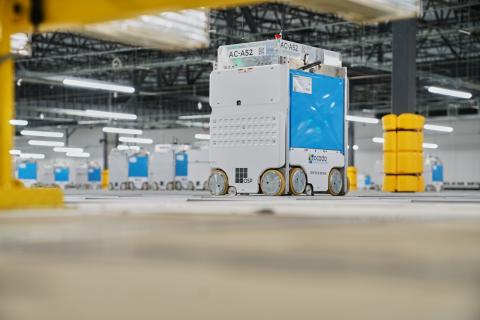
Accelerating Innovation
In the fourth quarter, Kroger grew new customer acquisitions through online pickup and delivery by 25%. One big reason for this is that the company is building a competitive advantage that leverages both stores and robotic warehouses, which the grocer revealed in 2018 that it would start building.
“Several years ago, we significantly increased the amount of resources, in terms of talent, expense and capital, on investing in technology to improve our technology that the customer connects with us on, but also improve the technology our associates use as well, to try to make their jobs easier to do,” McMullen explains. “The standard our teams are using is, really, how do you make technology so intuitive and so easy to use? And then how do we make sure that it’s personalized for that person individually? And have we arrived? No. But that’s our aspiration and desire, and every day our teams are doing AB testing to help move us in that direction.”
Kroger now has 2,200 locations that offer online grocery pickup, 2,500 locations that offer delivery, and at least 17 warehouses, or customer fulfillment centers (CFCs), that it’s planning to open by 2023. The grocer is leveraging these CFCs to enter new geographies without opening physical supermarkets. Just in the past month, Kroger has revealed it will offer grocery delivery in such new markets for the company as Alabama, Texas and California.
This expansion represents an extension of a partnership that began in 2018 between Kroger and U.K. online grocer Ocado. The companies teamed up to establish a delivery network that combines artificial intelligence, advanced robotics and automation. Through a hub-and-spoke delivery network, the organization now serves customers in Florida without brick-and-mortar stores. According to McMullen, the grocer’s delivery service in Florida is earning high customer repeat rates and net promoter scores.
As for competing with the proliferating quick-commerce startups of the world, Kroger launched in September Kroger Delivery Now, a new service in partnership with Instacart that offers fresh food, household essentials, meal solutions and snacks from early morning to late at night in 30 minutes or less. According to Kroger, the service was profitable “on day one after the first order.”
Last month, Kroger said that it would collaborate with Santa Clara, Calif.-based computing company NVIDIA to open a state-of-the-art artificial-intelligence lab and demonstration center within Kroger’s headquarters in Cincinnati, which will be used to further the grocer’s shipping logistics, freshness initiatives and store experience.
“Our collaboration with NVIDIA supports Kroger’s ‘Fresh for Everyone’ commitment,” says Wesley Rhodes, VP of technology transformation and research and development at Kroger. “We look forward to learning more about how AI and data analytics will further our journey to provide our customers with anything, anytime, anywhere.”
Kroger is also experimenting with a new loyalty program called Boost, plus drones, Nuro driverless vehicles, ghost kitchens and countless other innovative projects.
“When you think about innovation, to me that’s something that’s not been thought of,” McMullen says, “It’s also something that makes the world a better place, and I think all of us strive to be part of a team that makes the world a better place. I always like to say, ‘Respect the past and create the future.’ I’m super proud of what we’ve done, but at the same time, we’ll continue to strive to improve for our customers, our communities and our associates. And when we do that, our shareholders are rewarded as well.”

Living Its Purpose
Last month, Kroger said it will donate an additional $1.1 million into The Kroger Co. Foundation Racial Equity Fund to catalyze innovative approaches to help create more equitable and inclusive communities. For McMullen, diversity and inclusion are core values that the company must do better on.
“When the killing of George Floyd happened, we as a team decided that we were proud of what we had done, but we also agreed as a team that we can do more,” he observes.
Kroger has been doing a lot more on the environmental, social and governance (ESG) front, from establishing a Framework For Action: Diversity, Equity & Inclusion plan, to spending $4.1 billion to elevate diverse suppliers, to spending gobs of cash on the company’s more than 400,000 associates.
In 2021, Kroger invested $450 million to increase wages, bringing its average hourly wage to more than $22 with benefits factored in. Kroger offers its workers low-cost health care, 401(k)s and pensions, which many competitors don’t offer.
“One of the things that’s important for us is, I always say, ‘We have to make sure people stay at Kroger long enough to fall in love with us,’” McMullen notes. “Our purpose is to feed the human spirit. It’s so much more than just helping put a meal on somebody’s table. When we originally set our purpose on feeding the human spirit, when we talked to customers, they wanted something more than the food on their shopping list. When we talked to our associates, they wanted to provide something to others more than just their food.”
The company is also “living its purpose” through its Zero Hunger | Zero Waste program. In February, Kroger launched an exclusive, first-of-its-kind partnership in the United States with the Loop initiative of Trenton, N.J.-based TerraCycle to introduce a selection of products in reusable packaging rather than in single-use plastic.
“With our commitment to Zero Hunger | Zero Waste, last year we were able to provide 499 million meals. You look at over the last four years, north of 2 billion meals. And that’s an example of something that we strive to keep getting better on,” McMullen says.
He adds that the company’s ESG efforts, which aim to make Kroger a better place to work and to shop, all tie back to customer obsession.
“Everything we do really starts with the customer, and our obsession with taking care of the customer,” McMullen says. “If you look at the way we look at competition, you wouldn’t hear us talk too much about fighting off competition. It would be very focused on what does the customer want, what is the customer wanting that they may not even know they want? And then you test and learn on some of those things. We’re trying to be the best for our associates, we’re trying to be the best for our customers, and we’re trying to be the best for the communities we operate in.”





